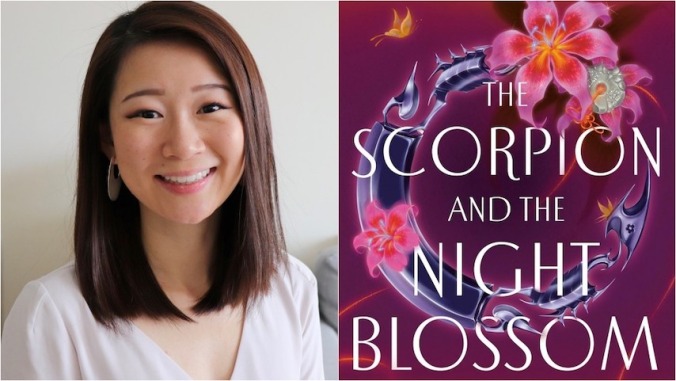Amélie Wen Zhao Introduces Us to the World of The Scorpion and the Night Blossom
Photo: Charlotte Yuyin Li
Author Amelie Wen Zhao is probably one of the most underrated writers in the fantasy space today. Known for their lush worldbuilding, lyrical prose, and complicated, frequently morally gray characters, her books are not only excellent, immersive fantasy stories but incorporate timely themes of systemic oppression, colonialism, hope, and justice. (That she also deftly works in elements of both real-world history and fascinating elements of Chinese mythology and folklore is an added—and excellent—bonus.)
The first installment of her new Three Realms dulogy, The Scorpion and the Night Blossom is set in a world at war, where the dark creatures of the Kingdom of Night have invaded the Kingdom of Rivers, leaving death, destruction, and oppression in their wake. It follows the story of Àn’yīng, a young woman whose family was devastated by an attack from one of these monsters, an event which left her father dead, her mother barely alive, and her younger sister with no one else to provide for her. Having been trained in the ancient art of practicing by their father, Àn’yīng is prepared to do whatever it takes to help her mother heal, even if it means joining a deadly competition to win the one thing that might save her—a pill of eternal life.
But the Immortality Trials hold many hidden dangers—the most unexpected of which might be the handsome practitioner Yù’chén, a young man who’s talented enough to win on his own, but who seems to be strangely invested in keeping Àn’yīng alive. Their enemies to reluctant partners to maybe something more relationship is the sizzling heart of this story, swoon-worthy, vaguely forbidden (or at the very least ill-advised), and one that ultimately challenges both their preconceptions of each other—and the world they live in.
Author Amélie Wen Zhao’s books are known for their lush worldbuilding, lyrical prose, and complicated, frequently morally gray characters. So it shouldn’t surprise anyone that her next book The Scorpion and the Night Blossom takes all those familiar pieces of her writing and cranks them up to eleven, crafting a high-stakes fantasy involving everything from a magical tournament where the prize includes a chance to live forever to a swoon-worthy central romance that grabs readers’ attention from the characters’ first interaction. (And which you’ll be able to experience for yourself below.
We had the chance to sit down with Zhao herself ahead of one of her signings at this year’s New York Comic Con to get a preview of The Scorpion and the Night Blossom, the inspiration behind the story, the romance at its center, and lots more.

Paste Magazine: First off, I have to tell you that I started reading Scorpion and the Night Blossom and I initially meant to just skim the beginning, you know, to get a feel for it and its characters before I talked to you. And I’m now 65% done after like a day and a half. I’m obsessed! It’s so good. But it feels like a real swerve for you, as a writer—it’s a much different story narratively and tonally than your other books. Where did this come from?
Amelie Wen Zhao: I really don’t know! [laughter] I feel like every story has its own origin story—with Song of Silver, Flame Like Night and the start of the Song of the Last Kingdom series, it was born out of homesickness. It was born out of a time when, you know, my community was being targeted and, as a diaspora, I really wanted a way to feel powerful when I felt most powerless. So, I wrote Song of the Last Kingdom in answer to that. It’s very heavy thematically, and it’s very politically charged, and it draws from history.
Scorpion found me like a fever dream. And I think that feels like the vibe of the book, right? I was literally working on another project—I was in the middle of writing my option, it was a fairytale realm-set story, a very comfy, cozy fantasy. And I woke up in the middle of one night, I remember it was in a hotel room in Washington, D.C., and I just had this vision of a girl dressed in white with blades fighting really good-looking but wicked demons. And it was this world that was super dangerous, but very sensory and very oversaturated with magic, with flowers, and everything. And I just wrote the story that I wanted to write at the time. So I think every story is kind of a time capsule for the one I wanted to read at the moment. And in this case, I wanted a total departure from, you know, real life and more into romance and fantasy.
Paste: It does feel really high fantasy, which I love.
Zhao: It is! There’s a lot more…I use the world-building in a very different way from my previous series. It’s used much more to explore romance and love. And it’s less heavy thematically.
-

-

-

-

- Curated Home Page Articles By Test Admin October 21, 2025 | 3:10pm
-

- Curated Home Page Articles By Test Admin October 21, 2025 | 2:57pm
- Urls By Test Admin October 21, 2025 | 2:57pm
- Curated Home Page Articles By Test Admin October 21, 2025 | 2:55pm
-

-

-

-

-

-

-

-

-

-

-

-

-

-

-

-

-

-

-

-

-

-

-

-

-

-

-

-

-

-

-




































